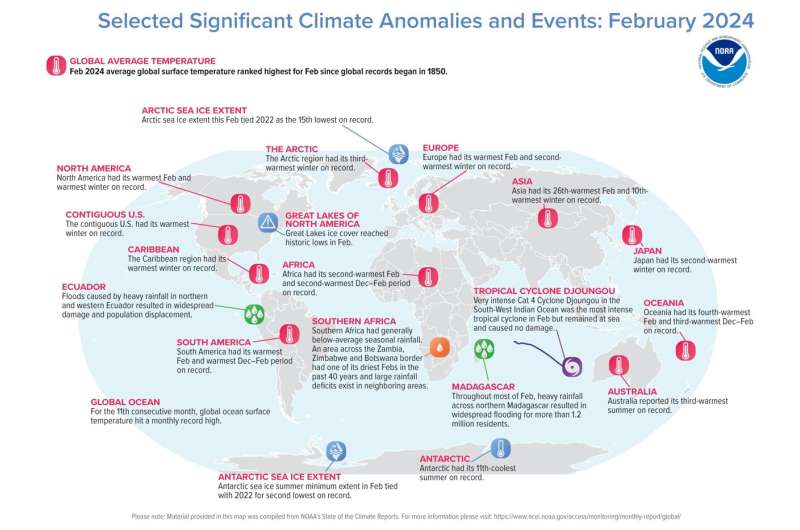Earth just had its warmest February on record: Report
Last month continued the world’s record-warm streak, with February 2024 ranking as the planet’s warmest February on record—the ninth month in a row of record-warm months.
What’s more, February 2024 wrapped up both hemispheres’ warmest December-through-February period on record, according to scientists from NOAA’s National Centers for Environmental Information.
Below are highlights from NOAA’s latest monthly global climate report:
February 2024 | Season (December 2023–February 2024)
The February global land and ocean surface temperature was 2.52°F (1.40°C) above the 20th-century average of 53.8°F (12.1°C), ranking as the warmest February in NOAA’s 175-year global climate record.
Looking how continents ranked, Europe, North America and South America had their warmest February on record, while Africa had its second warmest.
The three-month season (December 2023–February 2024) was the Northern Hemisphere’s warmest meteorological winter and the Southern Hemisphere’s warmest meteorological summer on record, with a global surface temperature of 2.45°F (1.36°C) above the 20th-century average.
The year-to-date (January and February 2024) temperature currently ranks as the world’s warmest such period on record. There is a 45% chance that 2024 will be the warmest year in NOAA’s 175-year record and a 99% chance it will rank in the top five.
Other notable climate events
Global sea ice coverage was sparse: Global sea ice extent (coverage) was the fourth smallest in the 46-year record, at 460,000 square miles below the 1991–2020 average. Arctic sea ice extent was slightly below average (by 100,000 square miles), whereas Antarctic sea ice extent was substantially below average (by 370,000 square miles), ranking second smallest on record.
Tropical activity was above average: Eleven named storms spun around the globe in February, which was above the 1991–2020 average of seven named storms. Only two storms made landfall, both bringing gusty winds to northern Australia. The only major tropical cyclone was Very Intense Tropical Cyclone Djoungou, which remained in the central Indian Ocean, well away from any major land masses.
There were no active storms in the Pacific Ocean or the North Atlantic, but there was one weak tropical cyclone (Akara) in the South Atlantic, which is notable because atmospheric conditions usually inhibit tropical storm development in that basin.
Citation:
Earth just had its warmest February on record: Report (2024, March 15)
retrieved 18 March 2024
from https://phys.org/news/2024-03-earth-warmest-february.html
This document is subject to copyright. Apart from any fair dealing for the purpose of private study or research, no
part may be reproduced without the written permission. The content is provided for information purposes only.

Last month continued the world’s record-warm streak, with February 2024 ranking as the planet’s warmest February on record—the ninth month in a row of record-warm months.
What’s more, February 2024 wrapped up both hemispheres’ warmest December-through-February period on record, according to scientists from NOAA’s National Centers for Environmental Information.
Below are highlights from NOAA’s latest monthly global climate report:
February 2024 | Season (December 2023–February 2024)
The February global land and ocean surface temperature was 2.52°F (1.40°C) above the 20th-century average of 53.8°F (12.1°C), ranking as the warmest February in NOAA’s 175-year global climate record.
Looking how continents ranked, Europe, North America and South America had their warmest February on record, while Africa had its second warmest.
The three-month season (December 2023–February 2024) was the Northern Hemisphere’s warmest meteorological winter and the Southern Hemisphere’s warmest meteorological summer on record, with a global surface temperature of 2.45°F (1.36°C) above the 20th-century average.
The year-to-date (January and February 2024) temperature currently ranks as the world’s warmest such period on record. There is a 45% chance that 2024 will be the warmest year in NOAA’s 175-year record and a 99% chance it will rank in the top five.
Other notable climate events
Global sea ice coverage was sparse: Global sea ice extent (coverage) was the fourth smallest in the 46-year record, at 460,000 square miles below the 1991–2020 average. Arctic sea ice extent was slightly below average (by 100,000 square miles), whereas Antarctic sea ice extent was substantially below average (by 370,000 square miles), ranking second smallest on record.
Tropical activity was above average: Eleven named storms spun around the globe in February, which was above the 1991–2020 average of seven named storms. Only two storms made landfall, both bringing gusty winds to northern Australia. The only major tropical cyclone was Very Intense Tropical Cyclone Djoungou, which remained in the central Indian Ocean, well away from any major land masses.
There were no active storms in the Pacific Ocean or the North Atlantic, but there was one weak tropical cyclone (Akara) in the South Atlantic, which is notable because atmospheric conditions usually inhibit tropical storm development in that basin.
Citation:
Earth just had its warmest February on record: Report (2024, March 15)
retrieved 18 March 2024
from https://phys.org/news/2024-03-earth-warmest-february.html
This document is subject to copyright. Apart from any fair dealing for the purpose of private study or research, no
part may be reproduced without the written permission. The content is provided for information purposes only.
